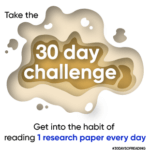
If you’re in the field of academia, you’re expected to read a LOT of research papers. In fact, as per studies, researchers should spend 23% of their total work time reading research artices.1 And this stems from the fact that the more you read, the better you are able to keep up with new developments, grasp concepts, decide a topic for your research and know how to present it effectively. But that’s not all; research reading has other benefits too.
What are the benefits of research reading?
Research reading holds paramount importance at every stage of your research journey. If you are someone who is just starting off, building a deep and unbiased understanding of that field by reading research articles will not only educate you on developments in your field but also help you envision the opportunities in your space.
If you are in a PhD program, you need to be reading about the latest developments around your topic and subject so that your literature review chapter is up-to-date (and not over 10 years old) when you submit your thesis.
If you are an early- to mid-career researcher, you need to read more broadly, learning about research topics that are tangentially related to your field, which might be useful for a future research project and/or collaboration.
No matter where you are in your career path, reading is an investment you won’t regret.
But is it that easy to make research reading a habit?
As a busy researcher, your job involves handling multiple tasks at a time, which leaves you little time to sit down and sort through the sea of papers, technical reports, and books in your field of research. And the amount of papers being published daily only keeps growing. So how do you identify what you should read and what you shouldn’t? More importantly, how can you make research reading a habit?
This is where we come in.
R Discovery, a literature search and reading app by Researcher.Life, helps academics across the globe simplify the way they discover, access and read scholarly articles. Based on cutting-edge innovations in AI, machine learning, NLP, and deep learning, R Discovery applies a researcher’s unique reading preferences to create a personalized reading feed, with daily suggestions of recent, relevant articles.
Apart from providing you with own personalized scientific library that makes reading academic articles easier, R Discovery offers lay summaries and article highlights for research papers, allowing you to quickly decide whether to read the full-text articles. You also get daily reading recommendations, weekly round-ups of trending research, and much more to help you read more regularly.
Take the first step to build a reading habit with the #30DaysOfReading challenge
Well, clearly, reading as a habit, is difficult to develop. One way to build it is to read every day; but that is easier said than done. It’s believed that it takes 21 days to create a habit, but what if you drop-out at the fifth day? Or even worse, what if you stay put till day 20, and drop out the last day? How do you stay motivated to read consistently?
You enrol for the 30 Day Reading Challenge.
How does it work?
Simply register for the #30DaysOfReading challenge by filling a form to become a part of the challenge. Download the R Discovery app, fill in your topics of interest, and that’s where your job ends. You’ll now get daily prompts via emails, with reading recommendations related to your area of interest.

Our online research community on Twitter will help you stay motivated. Be sure to share and track your progress with others who’ve taken on the challenge by using the #30DaysOfReading hashtag and tagging us. Here’s a sample tweet to get you started:
I am on Day X of the #30DaysofReading challenge by @researcher.life where we are #BuildingHabitualReaders together.
Joining the conversation online helps you recognize you’re not alone in the journey; there are thousands of researchers out there striving to achieve the same goal. If you stick with us, we guarantee that by the end of the month, not only will you have made research reading a happy habit, you’ll have built some great connections with peers online.
Like we said, it takes just 21 days to build a habit — here, we have 30. Should we count you in?
Register yourself for the #30DaysOfReading challenge here.
References
- Phillips, L. M., & Norris, S. P. Bridging the gap between the language of science and the language of school science through the use of adapted primary literature. Res Sci Educ. 39, 313-319 (2009)


